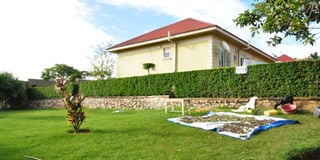Why you should have a village home

An upcountry home in Katete,Mbarara City. A village home can be your refuge from the noise in cities and towns. PHOTO/RAJAB MUKOMBOZI
What you need to know:
When coronavirus had just hit Uganda, a host of people left the city and other major towns but some did not have a place to call their own. They had to stay at their parents’ houses or with their siblings.
Rajab Mukombozi explains why everyone should have a village home.
In an interview with the Chief Administrative Officer Ibanda district, Nathan Ahimbisibwe, he says one of the lessons coronavirus pandemic has taught civil servants is the importance of having an upcountry home.
“It has been a good lesson to civil servants; I don’t know why most of us resent upcountry homes. You find someone does not want to even go to the village when on leave, 10 years he is in town .They only wait towards retirement or for loss of a job to think about an upcountry home . Yes towns are good but upcountry homes give you peace especially during retirement,” says Ahimbisibwe.
He adds that an upcountry home provides social security. Towns are prone to social destructions such as wars, civil disobedience, and loss of jobs and in such situations, your up country home can be your refuge. He gives an example of coronavirus where some people chose to go to the village.
Ahimbisibwe adds that when one loses their job, an upcountry home can be their refugee as the cost of living is lower than in towns.
Moses Mukiza, a resident of Kakiika, Mbarara, says having an upcountry home provides an opportunity for alternative investment.
He says for example having an upcountry home in an area where the community practises farming, to feel a sense of community belonging, you will find yourself get involved in farming.
“In 2015, I bought land in Bubaare, Kashari, where I wanted to establish an up country home. Here, the locals are banana growers and cattle keepers. Initially, I thought the five acres would be enough for my home but as years went by, I found myself getting into banana growing. Today I have 10 acres of banana plantations,” explains Mukiza, adding that even that upcountry home itself is an investment.
Life skills
An upcountry home also offers an avenue to pass on survival skills to children. Apart from formal education. Most children in towns are usually glued to TVs, video games and social media. They hardly have time to learn survival skills and even when there is time, they are limited by space to practice some of the survival skills such as gardening, milking a cow, looking after animals and birds. This is why some parents prefer to take their children to villages during long holidays.
Bwisho Ngabo, a resident in Mbarara City, says an upcountry home also helps you to connect with locals, friends and relatives.
He notes recently in Ntungamo Municipality, Kikoni ward, residents had refused to bury a colleague for abandoning the village and not belonging to a village group that organises decent burial of residents.
“The residents told the family and friends to hire prisoners or let his Kampala people bury him, it was not until we paid a fine of a bull and local brew that the residents joined us in the burial arrangements,” shares Ngabo.
An upcountry home can also be a source of income. There are people who may want to relax, have a retreat away from the congested, noisy towns to a rather cool and quiet environment and can hire, rent your upcountry home for these retreats. Also tourists can use your upcountry home for camping and relaxing.
Owning a village home
Mukiza says to have an upcountry home, working and having good relationship with the community where you intend to build a home is key.
“You have to socialise and relate with the local communities. Share some of resources with communities, say hello to neighbours, attend their functions for example burials and weddings, and community meetings. You may not be there personally but assign your manager to contribute to and attend such meetings,” advises Mukiza.
Some villages are still not connected to electricity but as you visit that upcountry home, you children still want to watch TV, you need to charge your phone or laptop.
However this should not stop you from investing in an upcountry home. You can think of having other alternative sources of power like solar.
Design on site
Wilber Tumurebire, a real estate dealer in Mbarara, also advises that if one is going to have an ideal upcountry home, they should make sure the planning and design for constructions is done on site.
He says some people intending to have upcountry homes just sit in towns and tell an architect the type of houses they want without even visiting the site.
“The design plan for an upcountry home should be done on site because the site location, type of soils, neighbourhood setting, and activities in the area of interest are vital in planning for an ideal upcountry home,” advises Tumurebire.
Working with local leadership
Tumurebire adds working with the local leadership protects you from fraudsters, especially when it comes to land transactions, ensuring your security and that of your property.
Village home
“You have to socialise and relate with the local communities. Share some of resources with communities, say hello to neighbours, attend their functions for example burials and weddings, and community meetings. You may not be there personally but assign your manager to contribute to and attend such meetings,» Moses Mukiza, Mbarara




